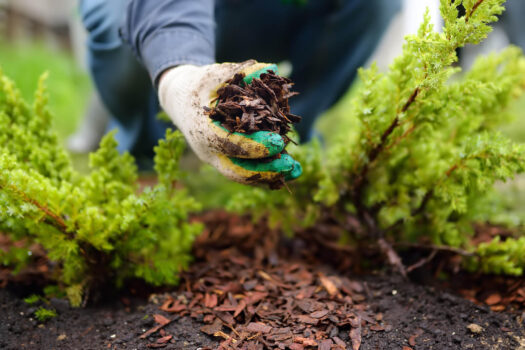Benefits of trees
 What could be more obvious than the fact that horticulture benefits people? Anyone making a living in the trades understands it instinctively.
What could be more obvious than the fact that horticulture benefits people? Anyone making a living in the trades understands it instinctively.
Below are some quick facts on the benefits of trees and the equity value of landscaping.
Trees improve health
- Trees improve moods and emotions, and they create feelings of relaxation and well-being.
- Trees provide privacy and a sense of security.
- Foliage helps to settle out, trap and hold particulate pollutants (dust, ash, pollen and smoke) that can damage human lungs.
- Because of their potential for long life, trees frequently are planted as living memorials. We often become personally attached to trees that we or those we love have planted.
- In cities, trees can act as buffers, absorbing a significant amount of urban noise.
Trees add natural character to our cities and towns
- Provide us with colours, flowers, and beautiful shapes, forms and textures.
- Trees add interest by changing with the seasons.
- Trees and associated plants create habitat and food for birds and animals.
Trees reduce pollution
- Trees absorb carbon dioxide and other dangerous gases and, in turn, replenish the atmosphere with oxygen.
- An acre of trees produces enough breathing oxygen for 18 people every day.
- An acre of trees absorbs enough carbon monoxide over a year’s time, to equal the amount you produce when you drive your car 26,000 miles.
- A single mature tree can absorb 48 pounds of carbon dioxide per year, and release enough oxygen back into the atmosphere to support two human beings.
- Over 50 years, a tree generates $31,250 worth of oxygen, provides $62,000 worth of air pollution control, recycles $37,500 worth of water, and controls $31,250 worth of soil erosion.
- City streets lined with trees show a 60 per cent reduction in street-level particulate readings.
- One 12-inch sugar maple along a roadway removes 60 mg of cadmium, 140 mg of chromium, 820 mg of nickel and 5,200 mg of lead from the environment each growing season.
Trees conserve water and prevent soil erosion
- Trees reduce surface runoff from storm water, and prevent soil erosion and sedimentation of streams.
- Trees increase ground water recharge to help make up for losses in paved areas.
- Trees prevent wind from eroding soil.
Trees save energy
- Deciduous trees provide shade and block heat from the sun during hotter months. By dropping their leaves in the fall they admit sunlight in the winter.
- Shade from trees over hard surfaces such as driveways, patios and sidewalks minimizes landscape heat load.
- Shade trees can reduce air conditioning costs up to 30 per cent.
- Evergreens planted on the north sides of buildings can intercept and slow winter winds.
Trees increase economic stability
- Trees enhance community economic stability by attracting businesses and tourists.
- Healthy trees can add up to 20 per cent to residential property values.
Sources
South Carolina Forestry Commission, www.state.sc.us/forest/urbben.htm
Colorado Tree Coalition, www.coloradotrees.org/benefits.htm#Large_tree
International Society of Aboriculture, www.treesaregood.com/treecare/tree_benefits.aspx
Shannon Lindensmith, Georgina Garden Centre, Georgina, Ont.









